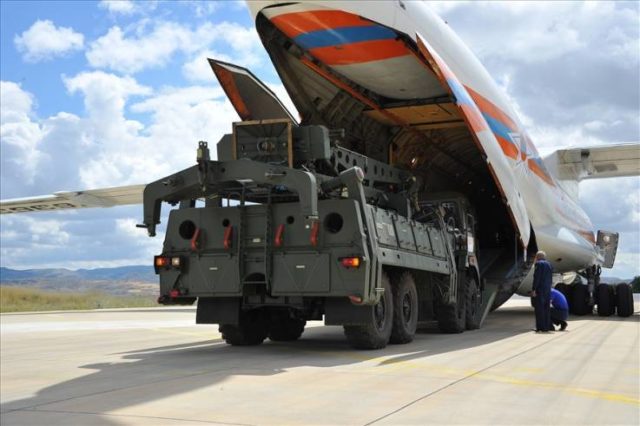
The U.S. government announced Wednesday that it is canceling Turkey’s participation in the F-35 fighter jet program. For weeks, Washington had cautioned Ankara that purchasing the S-400 air defense system from Russia would preclude the U.S. from continuing Turkey in the program, and Turkish pilots had already been removed from F-35 training. When the first shipments of the Russian system arrived in Turkey last week, the White House decided to remove Turkey from the program.
Ankara agreed to buy the system for $2.5 billion from Moscow in 2017.
The White House released a statement noting, “The F-35 cannot coexist with a Russian intelligence-collection platform that will be used to learn about its advanced capabilities.” In the same statement, Washington expressed concern over Turkey’s commitment to NATO: “Turkey has been a longstanding and trusted partner and NATO ally for over 65 years, but accepting the S-400 undermines the commitments all NATO allies made to each other to move away from Russian systems.”
Turk’s ejection from the joint strike fighter will have a sizable effect on the program, as Ankara planned to acquire 116 planes. Currently, Turkey formally owns four jets, but the U.S. has stated its intent to exercise its authority to keep the planes on U.S. soil. Turkish personnel working on the program in the U.S. have been asked to leave the States by July 31st. All current operations in Turkey must be moved to the United States, costing the U.S. between $500-600 million. Additionally, Turkey will incur a far greater cost because its defense industry will no longer be able to provide components and maintenance for the jet. Current projections estimate that “unwinding” the project from Turkey will ultimately cost the country’s economy $9 billion.
Meanwhile, the first parts of the S-400 were delivered last Friday, flown into an airbase northwest of Ankara. The government even released photos of crews unloading the system from a Russian cargo plane.
The Turkish government blamed the United States for damaging the long-standing alliance between the two countries. The foreign ministry has reportedly claimed the decision was “not fair” and will have lasting effects on the alliance. Turkey has called on the U.S. to reverse its decision and had previously proposed negotiating through a working group. Foreign Policy reports that Turkey may now turn to Russia to supply its fighter jets, including the Su-35 and Su-57 Flankers.
The week’s development highlights the continued strained in relationships between the Washington and Akara over the past decade. Under Turkish President Recep Tayyip Erdoğan, Turkey has prioritized ties with Russia, undermined NATO unity, and has oppressed democracy at home, and ultimately damaging its standing as a U.S. ally.





